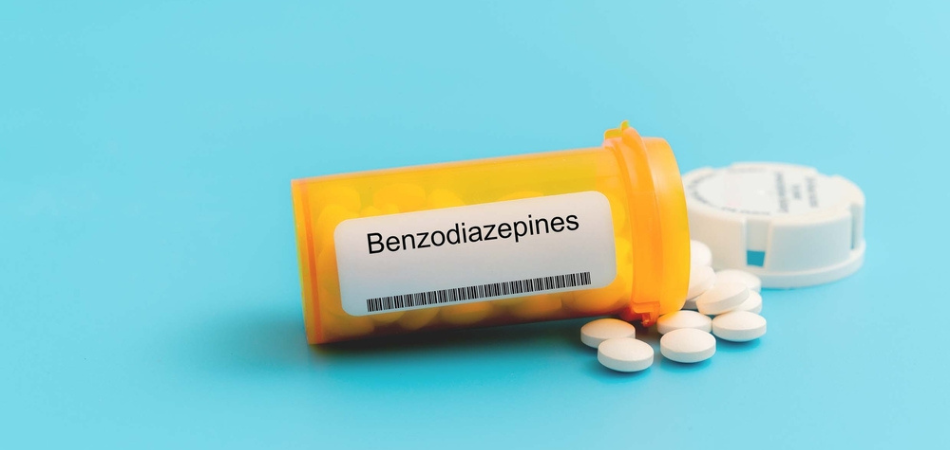
Written by:

Medically Reviewed by:
Last Updated:
January 15th, 2025
Benzodiazepine Addiction | Symptoms and Effects
Benzodiazepines, often referred to as ‘benzos’, are a type of prescription drug commonly used to treat conditions such as anxiety, panic disorders, insomnia and seizures. While these drugs are effective in the short-term, persistent use can lead to physical and psychological dependency. Benzodiazepine addiction, unfortunately, affects thousands of people every year, with users often finding it extremely difficult to break their reliance on them without professional help.
If you believe you have an addiction to benzodiazepines and would like support, Recovery Lighthouse can assist you throughout your recovery.
What are benzodiazepines?
Benzodiazepines belong to a class of drugs known as sedatives or depressants, which affect the nervous system and slow down the body’s processes. They work by increasing the activity of gamma aminobutyric acid (GABA) in the brain, a neurotransmitter responsible for emotions, memory and reasoning. This change in brain chemicals results in feelings of relaxation, drowsiness and reduced anxiety or tension.
Benzos are a legal prescription drug in the UK but if you are caught in possession without a prescription, you could face up to 2 years in prison and/or an unlimited fine. If you are caught supplying benzos to others, the maximum sentence is 14 years and/or an unlimited fine.
Some of the most common benzodiazepines in the UK include Ativan, Klonopin, Valium and Xanax.
How does benzodiazepine addiction develop?
There are a number of ways that benzodiazepine addiction develops – this could include through a prescription from a doctor or via recreational use.
Prescription from a doctor
A medical practitioner may prescribe you benzodiazepines to treat a genuine medical condition. Sadly this has the potential to lead to an addiction, especially if you:
- Take more benzos than prescribed
- Take benzos more frequently than prescribed
- Take benzos for more than 4 weeks
It is therefore important to follow your doctor’s instructions carefully if you have been prescribed benzodiazepines and be aware of the signs of addiction so you can take action if you notice your usage getting out of control.
Recreational use
Due to the calming and pleasant side effects associated with benzo use, many people take them recreationally, with the intent of getting ‘high’. This puts you at risk of developing an addiction, especially if you:
- Have a tendency to engage in substance abuse
- Suffer from mental health issues
- Have close family members with addiction
- Have experienced trauma
- Struggle to cope with stress or negative emotions
Although anyone has the potential to become a victim of benzodiazepine addiction, these genetic, psychological and environmental factors can put you at a greater risk.
Am I addicted to benzodiazepines?
If you are asking yourself this question, it is likely you have already noticed a problem with your benzodiazepine use. However, taking the first step and admitting you have a problem can be tough. It is important to recognise that there is no shame in getting help – in fact, it can be a liberating experience.
But how do you know if you have a problem? And when is the right time to seek help? Take a moment to read the following statements and see if any apply to you:
- I need higher doses of benzodiazepines to feel the same effects.
- I feel like I can’t get through the day without benzos.
- I exaggerate my symptoms in order to get a doctor’s prescription.
- I make numerous doctor’s appointments or go ‘doctor shopping’ in order to obtain benzos.
- I experience withdrawal symptoms if I go without benzodiazepines.
- I have tried to stop taking benzos but was unsuccessful.
- I have experienced trouble at work or school as a result of my benzo use
- I have experienced problems with relationships as a result of my benzo use.
- I try to hide or lie about the amount of benzodiazepines I take.
If you can relate to even one of these statements, it is possible that you have an addiction to benzodiazepines. This is a serious condition and may already be impacting your life in negative ways. In order to break free, professional treatment is an essential tool and starting sooner rather than later can make all the difference to your success.
Addictive benzodiazepine drugs
Clonazepam addiction
Learn more about the signs, symptoms and effects of a clonazepam addiction.
Diazepam addiction
Learn more about the signs, symptoms and effects of a diazepam addiction.
Halcion addiction
Learn more about the signs, symptoms and effects of a Halcion addiction.
Librium addiction
Learn more about the signs, symptoms and effects of a Librium addiction.
Lorazepam addiction
Learn more about the signs, symptoms and effects of a lorazepam addiction.
Nitrazepam addiction
Learn more about the signs, symptoms and effects of a nitrazepam addiction.
Temazepam addiction
Learn more about the signs, symptoms and effects of a temazepam addiction.
Xanax addiction
Learn more about the signs, symptoms and effects of a Xanax addiction.
The dangers of benzodiazepine addiction
Benzos are a prescription drug and this often lulls people into a false sense of security – afterall, surely your doctor would not prescribe anything dangerous? But unfortunately taking these drugs outside of the ways prescribed can be very harmful and even life-threatening.
Some of the dangers of benzodiazepines include:
- Dizziness
- Confusion or delirium
- Nausea
- Headaches
- Vertigo
- Memory problems
- Depression
- Increased risk of accidents or injury
It is also possible to overdose on benzodiazepines. Signs of an overdose include:
- Extreme sedation
- Slurred speech
- Loss of conciousness
- Inability to control muscles
- Low breathing rate
- Coma
- Death
Mixing benzodiazepines with other substances can also prove fatal. For example, taking benzos with alcohol, another depressant, can cause your breathing to slow to a deadly rate. Taking benzos with stimulants can also have devastating effects as it is possible your body will be overwhelmed by the conflicting substances working against each other, causing cardiac arrest and heart failure.
Signs your loved one is addicted to benzos
An addiction to benzos is easy to hide – for many people, benzodiazepines are prescribed legitimately, and so you may not notice a problem with a loved one until further down the line. If you do suspect a family member is struggling to control their benzo use, there are some signs to look out for. These may include:
- Inability to make sound decisions or issues with cognitive function
- Sleeping for long periods of time
- Mood swings, irritability and agitation
- Displaying secretive behaviour or isolating themselves from friends and family
- Frequently ‘losing’ their prescription or going to the doctor often
- Complaining about being unable to get a prescription
- Loss of interest in hobbies or other activities
- Inability to function without benzodiazepines
If your loved one is exhibiting any of these signs, it is important to approach them in a sensitive manner. Try to avoid judgement or accusations, but instead come from a place of understanding. Offer your support, help to research treatment options and let them know you will be there for them every step of the way.
The truth about benzodiazepine addiction
Quitting benzodiazepines is incredibly difficult
Benzos are both mentally and physically addictive. Once your body has become dependent on them, it is very hard to break the habit. Your body will go through uncomfortable withdrawal symptoms every time you abstain from benzos, leading you to use again. This is what keeps so many people trapped in a vicious cyle of addiction.
Benzodiazepine addiction can happen quickly
Tolerance to benzodiazepines can, for some, develop within a matter of days, meaning that you need more of the drug to feel the same effects. Dependency and addiction to benzos soon follows, in some cases taking hold within just a few weeks. Short-acting benzodiazepines in particular (like Xanax or Ativan) have high rates of addiction due to their short-lived effects that leave you wanting more.
Benzodiazepine addiction can put you at risk of Alzheimer’s disease
Studies have shown a link between benzodiazepine use and Alzheimer’s disease. This is likely due to the disruption to GABA neurotransmitters in the brain, leading to significant memory issues. Long-term exposure to benzos put you at a much higher risk of developing Alzheimer’s.
Anyone can become addicted to benzos
Benzodiazepine addiction does not discriminate – it can impact anyone, no matter your age, gender, race or social status. It does not matter if you were prescribed benzos by your doctor, or if you started taking them recreationally, abusing these drugs can quickly lead to a spiral of dependency and addiction.
Can I overcome benzodiazepine addiction?
Overcoming a benzodiazepine addiction is certainly possible for anyone willing to put in the hard work required. The most comprehensive and effective form of treatment is inpatient rehab. Recovery Lighthouse focuses on three main areas of recovery: detox, rehabilitation and aftercare.
Detox
Quitting benzos ‘cold-turkey’ can be life-threatenting, and so it is recommended that the detox and withdrawal phase is completed under the supervision of medical professionals. At Recovery Lighthouse, our team is dedicated to ensuring your detox is safe, comfortable and successful.
Rehabilitation
Recovery Lighthouse also offers an extensive range of therapies, including group and individual counselling. Through therapy you will uncover the root causes of your addiction, work on any co-occurring mental health disorders and develop relapse prevention techniques that are vital in maintaining sobriety.
Aftercare
Attending an aftercare programme is just as important as your inpatient stay. It provides support, accountability and ongoing care once you go back to your day-to-day life. Recovery Lighthouse offers 1 year of free aftercare, including weekly support groups and therapy, to all of our clients.
What’s next?
If benzodiazepine addiction has been consuming your life, ruining your relationships and taking a toll on your physical and mental well-being, Recovery Lighthouse can help you to get back on track. While it may not seem like there’s a way out, you can escape this condition with the right resources. If you’d like to begin your journey and start recovering, get in touch with our admissions team today.












